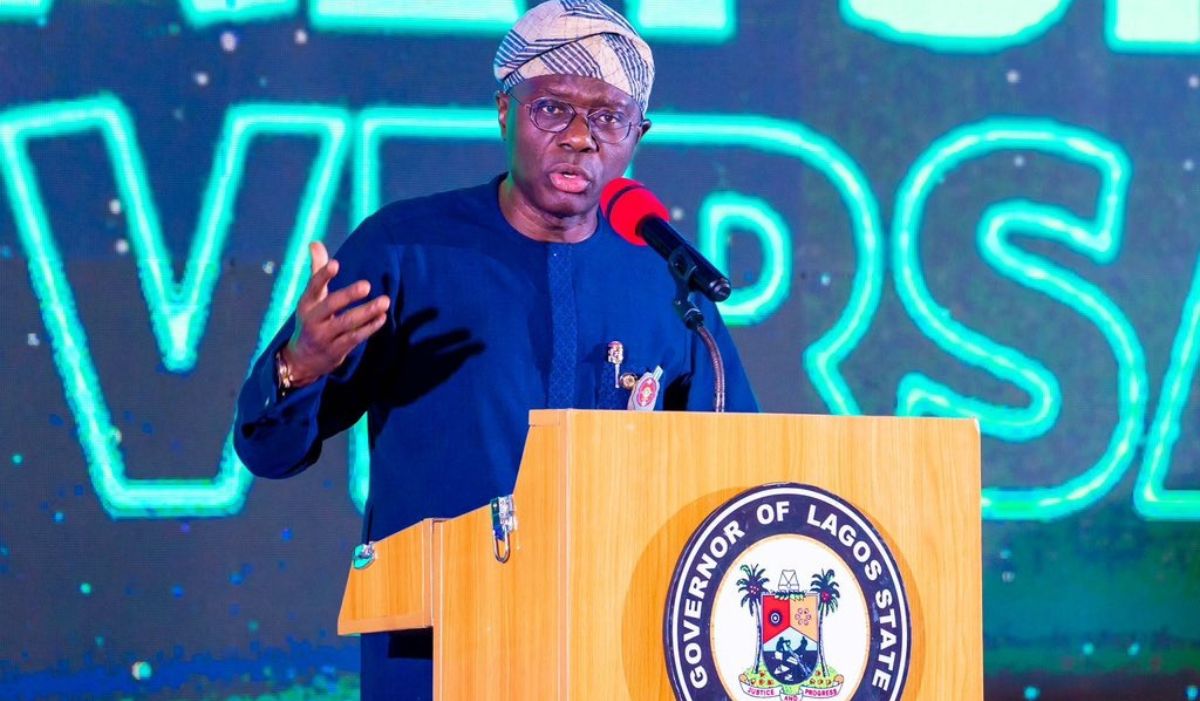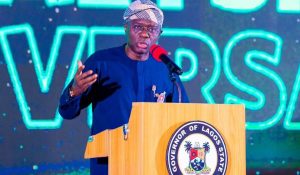
SANWO – OLU: A STATESMAN AS GOVERNOR

By: Motunrayo Aniwura
In the last few weeks, I have consistently reviewed the activities of Governor Babajide Sanwo-Olu in Lagos and I have come to one conclusion: he is more of a statesman than a politician. He has weathered the storm on many fronts and remains calm amidst what seems like distractions.
As I settled down at my library a few hours before embarking on this piece, my eyes caught the quote of A.P.J. Abdul Kalam that “If you want to shine like a sun, first burn like a sun”. As I read and read again, my mind shifted to a bloodless war we fought against COVID-19 and how Governor Sanwo-Olu as the captain of Lagos troop forged on seamlessly and came out victorious. I am a living witness to the ravaging effect of the battle. Then, I thought of the dark days of the EndSARS and how the world focused on Lagos and the governor. Despite the blackmails, half-truths, social media lies and campaigns of calumny, Sanwo-Olu remained calm, assuring everybody who cared to listen that truth would prevail. At the end, truth didn’t only prevail Governor Sanwo-Olu was equally vindicated.
In all, I see Abdul Kalam’s theory in working. Today, the Lagos State Governor is shining like a sun because he has offered himself to be burnt like a sun. Behind his calmed mien and simplicity lies a strategy grand master, whose multitasking nature has helped in governance, politics, and at the same time giving his best to Lagosians in the area of infrastructure.
In Nigeria, being an “executive governor” or “honourable minister”, guarantees the lucky occupant and his immediate family a life of luxury, with several other benefits. Ordinarily, this ought to push them to deliver quality services to the people. But sadly, all Nigerians get in return from their “excellencies and honourable ministers”, are services that are not in any way commensurate with the freebies they enjoy. The return on investment on public office holders is so poor that where they project, Nigerian banks that hate risks would have long stopped funding them.
Under Sanwo-Olu, the story is different. From traffic management and transportation to health and environment, Sanwo-Olu stands tall in the way he has redefined the various sectors. Unfortunately, like a student of Benjamin Disraeli, a British statesman, Conservative politician and writer who twice served as Prime Minister of the United Kingdom and credited for the quote “Never complain and never explain”, Sanwo-Olu keeps both his achievement and challenges to himself. His simplicity shows in every facet of his life, his family, and approach to humanitarian services. Interestingly, this has also impacted his activities as governor. He is one of those few leaders who are trusted with the mandate of governance and have delivered well but choose to avoid unnecessary showmanship. His reaction to publicity has always been; “Let our performance speak for us”.
For instance, until early last year, when President Bola Tinubu commissioned the first phase of the Lagos Rail Mass Transit (LRMT) Red Line project, only a few stakeholders knew the enormity of the project.
The inaugurated segment of the 37-kilometer Red Line, running 27 kilometers from Agbado in Ogun State to Oyingbo, integrates eight strategically located stations: Agbado, Iju, Agege, Ikeja, Oshodi, Mushin, Yaba, and Oyingbo.
The construction of the first phase of the Red Line commenced on April 15, 2021, and was successfully completed 30 months after. The Red Line, which was designed to utilize shared tracks with the Nigerian Railway Corporation’s (NRC) Lagos to Ibadan route, is a novel achievement that aligns with the Lagos mega-city status.
Sanwo-Olu, in his speech at the inauguration event, revealed that the Central Bank of Nigeria (CBN) played a crucial role in mobilizing local funding for the project. This financial support was further bolstered by contributions from three major local banks: United Bank for Africa, First Bank, and Zenith Bank. He also announced the acquisition of trains for the Red Line from the United States, with additional rolling stock procured from the United Kingdom in 2023 and China a few weeks later.
Designed to drastically cut down travel time, the Red Line enables passengers to cover the distance from Agbado to Oyingbo in a mere 40 minutes—a significant improvement over the more than three-hour journey by road. Moreover, the train’s capacity is designed to accommodate over 1 million people per trip, according to LAMATA.
At full capacity, the Red Line started with transportation of 250,000 passengers daily. This figure was anticipated to surge to 750,000 daily passengers once it is fully operational and all additional rolling stock are integrated into the system.
As this was going on, the government commenced a preliminary work on two additional lines within the LRMT system—the Green Line and the Purple Line. The Green Line will extend 71.4 kilometres from Marina to the Lekki Free Trade Zone, while the Purple Line would run 53.4 kilometres from Ojo to Mowe in Ogun State.
Looking ahead, Governor Sanwo-Olu indicated plans for the future development of two more rail lines within the LRMT system: the Orange Line and the Yellow Line, signalling continued growth and expansion of Lagos’s rail infrastructure
At the commissioning, President Tinubu had commended Sanwo-Olu and highlighted the pivotal role of the Lagos Metropolitan Area Transport Authority (LAMATA). According to President Tinubu, he established LAMATA over twenty years ago during his governorship in Lagos to shape the state’s transportation landscape, acknowledging Sanwo-Olu’s key involvement in its creation.
Meanwhile, to reduce train and vehicular interactions, the government also inaugurated five flyover bridges as part of the Red Line Rail project. The newly built flyovers include Oyingbo, Yaba, Ikeja, Agege Pen Cinema, and Mushin.
Knowing well the aquatic nature of Lagos State, Governor Sanwo-Olu also commissioned 15 locally-built, high-capacity passenger ferries last year to enhance marine transportation. These ferries, designed to carry 40 passengers each, are part of a broader plan to increase the state’s marine transport infrastructure. The initiative aims to shift towards local manufacturing and backwards integration, with the ferries being crafted to international standards but with engines sourced from abroad. The commissioning, which took place at the Badore Ferry Terminal, represented the first phase of a larger project that envisions a total of 25 ferries. Needless to say that hundreds of thousands of Lagosians have been enjoying the services of LagFerry via waterways transportation.
Another significant feature of Sanwo-Olu administration is the regard he has for the youth population. Through many interventions, the governor has demonstrated that Lagos youths are so dear to his heart. In the transport sector for instance, over 1,800 jobs generated through the operation of the Lagos Bus Service Limited (LBSL), while over over 1000 direct and indirect jobs were created for the youths through the operation of the Lagos Blue Line Rail. In the same way, with the inauguration of the Red Line, hundreds of youths were absorbed and trained for jobs on the Red Line. Also, over 1000 jobs have since been created through the LAGRIDE smart taxi scheme, while 2,866 job opportunities were provided for young drivers who graduated from Lagos Bus Service Limited (LBSL) accredited training academy.
Above all, under Sanwo-Olu, by mid last year, the Lagos State government completed and commissioned 172 roads translating to 177.93 km as it increased the pace of work on 253 other projects, totaling 298.22 kilometres of roads, 2.510 km of bridge and another 3.13km that are currently being completed in different parts of the state. The inauguration of the various roads was part of the activities put in place to mark the governor’s first year of his second term in office.
Despite various distractions and the huge population of Lagos, he Sanwo-Olu has given a good account of himself. He created platforms for engagement. This has made it possible for his government to get the necessary buy-in of both the young and the old, the market women and the artisans and even the traditional rulers.
By consolidating on the development of the new Lagos state, Governor Sanwo-Olu has etched his name forever in the hearts of the people, beyond the boundaries of the state. In six years, Governor Sanwo-Olu has shown that development is possible with total dedication and commitment to the people. Though he still has two years to go, like Julius Caesar, he can proudly proclaim: “I came, I saw and we’re conquering”.
